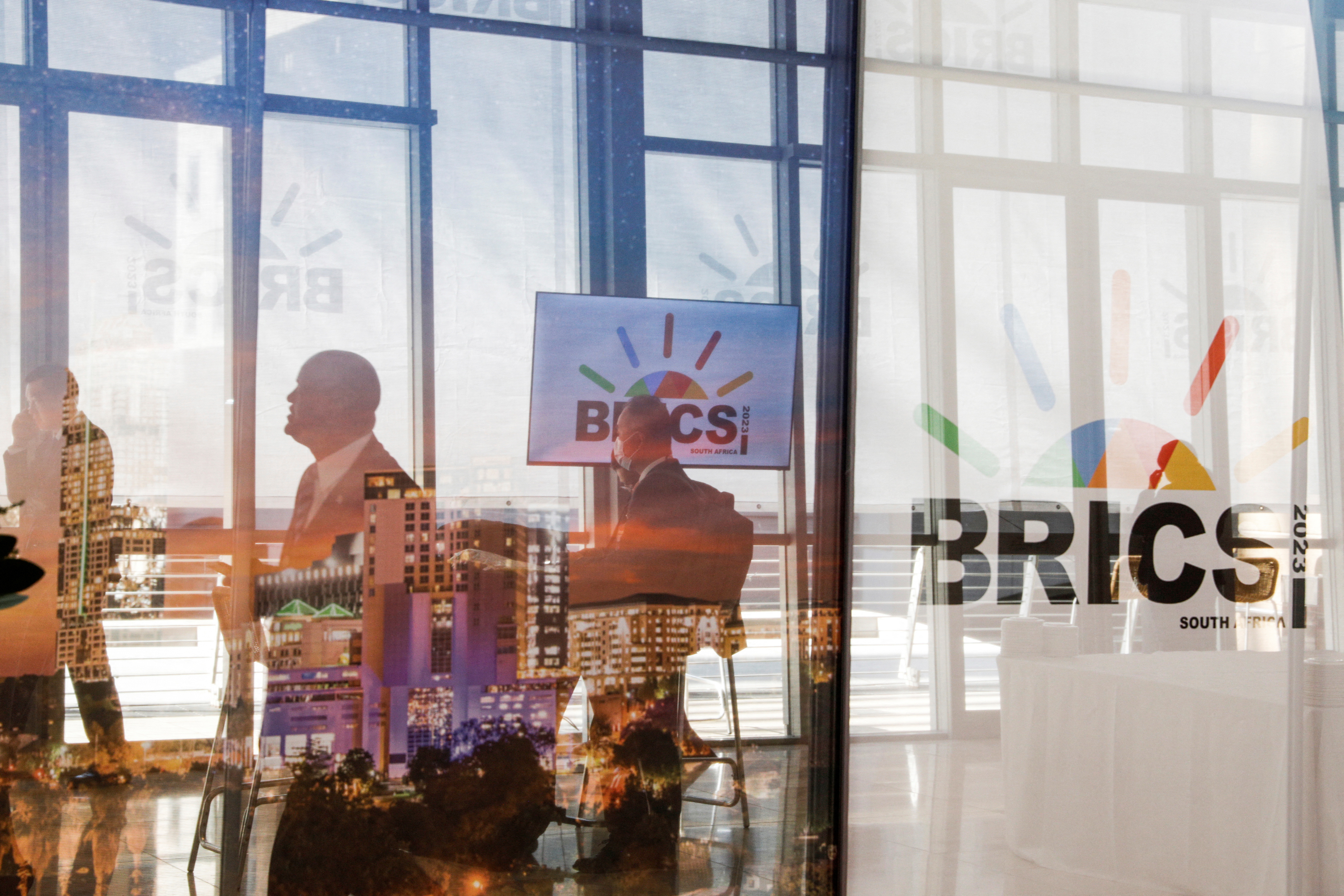Explainer: What is a BRICS currency, and could one be adopted?
Delegates walk past the logos of the BRICS summit during the 2023 BRICS Summit at the Sandton Convention Centre in Johannesburg, South Africa on August 23, 2023. GIANLUIGI GUERCIA/Pool via REUTERS Acquire Licensing Rights

JOHANNESBURG, Aug 23 (Reuters) - Brazil's President called on Wednesday for the BRICS nations to create a common currency for trade and investment between each other, as a means of reducing their vulnerability to dollar exchange rate fluctuations.
Luiz Inacio Lula da Silva made the proposal at a BRICS summit in Johannesburg.
Officials and economists have pointed out the difficulties involved in such a project, given the economic, political and geographic disparities between Brazil, Russia, India, China and South Africa.
WHY DOES LULA WANT A BRICS CURRENCY?Brazil's president doesn't believe nations that don't use the dollar should be forced to trade in the currency, and he has also advocated for a common currency in the Mercosur bloc of South American countries.
A BRICS currency "increases our payment options and reduces our vulnerabilities," he told the summit's opening plenary session.
WHAT DO OTHER BRICS LEADERS THINK?South African officials had said a BRICS currency was not on the agenda for the summit.
In July, India's foreign minister said, "there is no idea of a BRICS currency". Its foreign secretary said before departing for the summit that boosting trade in national currencies would be discussed.
Russian President Vladimir Putin said the gathering, which ha attended via videolink, would discuss switching trade between member countries away from the dollar to national currencies.
China has not commented on the idea. President Xi Jinping spoke at the summit of promoting "the reform of the international financial and monetary system".
WHAT ARE THE CHALLENGES OF SETTING UP A BRICS CURRENCY?Building a BRICS currency would be a "political project", South African central bank governor Lesetja Kganyago told a radio station in July.
"If you want it, you'll have to get a banking union, you'll have to get a fiscal union, you've got to get macroeconomic convergence," Kganyago said.
"Importantly, you need a disciplining mechanism for the countries that fall out of line with it... Plus they will need a common central bank... where does it get located?"
Trade imbalances are also a problem, Herbert Poenisch, a senior fellow at Zhejiang University, wrote in a blog for think-tank OMFIF.
"All BRICS member countries have China as their main trading partner and little trade with each other."
IS THE U.S. DOLLAR IN TROUBLE?BRICS leaders have said they want to use their national currencies more instead of the dollar, which strengthened sharply last year as the Federal Reserve raised interest rates and Russia invaded Ukraine, making dollar debt and many imports more expensive.
Russia's sanctions-imposed exile from global financial systems last year also fuelled speculation that non-western allies would shift away from the dollar.
"The objective, irreversible process of de-dollarisation of our economic ties is gaining momentum," Putin told the summit on Tuesday.
The greenback's share of official FX reserves fell to a 20-year low of 58% in the final quarter of 2022, and 47% when adjusted for exchange rate changes, according to International Monetary Fund data.
However, the dollar still dominates global trade. It is on one side of almost 90% of global forex transactions, according to Bank of International Settlements Data.
De-dollarising would need countless exporters and importers, as well as borrowers, lenders and currency traders across the world, to independently decide to use other currencies.
Reporting by Rachel Savage, Additional reporting by Ethan Wang in Beijing, Marcela Ayres in Brasilia, Gabriel Stargardter in Rio de Janeiro, and Naomi Rovnick, Libby George and Marc Jones in London, Editing by John Stonestreet
Our Standards: The Thomson Reuters Trust Principles.
Rachel Savage is Africa Senior Markets Correspondent at Reuters, where she covers finance and economics across Sub-Saharan Africa, from sovereign debt crises and IMF programs to foreign exchange markets and cryptocurrencies. Previously she was LGBT+ Correspondent at the Thomson Reuters Foundation for just over three years and was awarded Journalist of the Year in 2021 by the NLJGA: The Association of LGBTQ Journalists, a U.S. group. Before that, Rachel was based in Nairobi and then Lagos as an East and West Africa Correspondent for The Economist, after starting her career a decade ago as a business journalist in London.









































